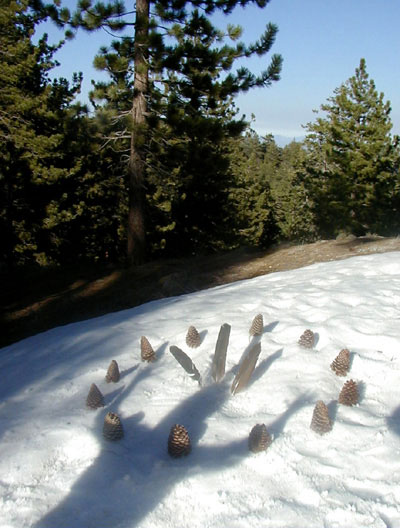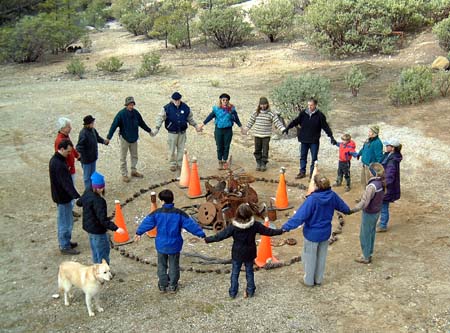Shasta-Trinity National Forest
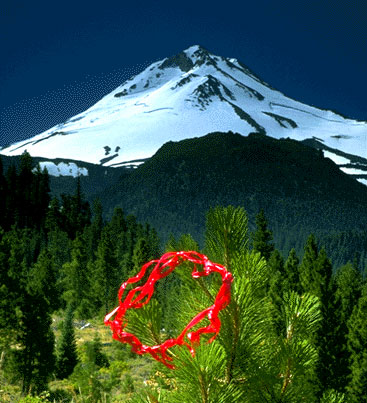
Red Ribbon
Ring.
A spool of red ribbon found along the roadside was used to make this simple
circle in a young ponderosa growing in a 10 year old clearcut. The Shasta-Trinity
National Forest contains 2.1 million acres and 14,218 ft. Mt. Shasta dominates
the region. Local activists and Native American's recently won a 10 year
battle to keep an expanded ski resort of Mt. Shasta's slopes. To be envolved
with forestry issues concerning this huge national forest contact: Citizens
for Better Forestry, POB 1510, Hayfork, CA 96041, phone-916-628-5004 or
Mt. Shasta Bioregional Heritage Center, POB 1143, Mt. Shasta, CA 96067,
shastahome@jps.net.

California's Headwaters Forest is one of the most incredible and endangered forests on our planet. The 60,000 acre Headwaters forest in northern California is made up of several groves like the one pictured above. These groves contain ancient trees well over 1500 years old. Unfortunately they exist on private lands owned by the infamous corporate raider, Charles Horwitz and his company, Pacific Lumber. Many heros have emerged in the decade long effort to protect these groves. Most inspiring certainly, is Julia Butterfly Hill who climbed atop a redwood tree named 'Luna' in December 1997. She vowed not to come down until these groves achieved protection. A year into her effort, she commented on a deal passed by the California State Legislature to protect the largest grove while sacrificing the rest. "Even with the new protections incorporated by the Legislature, Luna and the slope she stands on will be destroyed under the Headwaters Forest Agreement and Habitat Conservation Plan, along with hundreds of other similarly steep, unstable slopes and thousands of acres of virgin and residual old growth.The government once again has turned its back on the local residents and the endangered species that it is required to protect. We support the protection of habitat through public acquisition where necessary, but not when attached to a Habitat Conservation Plan that amounts to a license to kill endangered species." After completing TWO YEARS atop Luna, she eventually won protection for Luna and neighboring trees. She is on the ground now working hard as a forest and social activist.To find out how to help protect the remaining Headwaters groves and to visit the group Julia founded called, Circle of Life. During her tree sit ZeroCircles sponsored her website which spread Julia's message to the world. LUNATREE.ORG is now archived on In Concert With Nature.
Fern Hoop, Owl Creek Grove
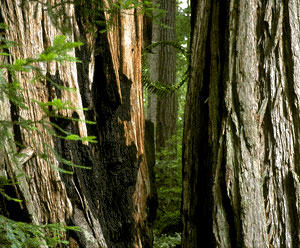
Klamath National Forest
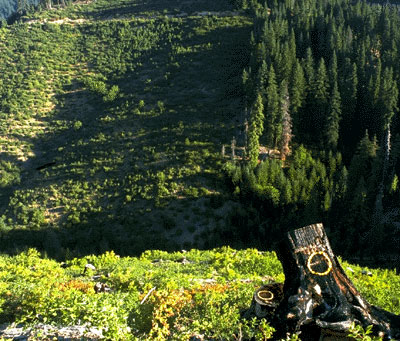
Two Circles.
Twin circles were made by using thorns to tack leaves upon two blackened
stumps at the edge of a road overlooking a largeclearcut. Klamath National
Forest is the headwaters of the Klamath River, the largest river in northern
California. Scientists conclude there is a very real prospect of wide spread
extinction of Pacific salmon and steelhead stocks in this watershed due,
in large part, to extensive over cutting in the region. Clearcuts like
the one below and its' associated roading network contribute tons of silt
to fishbearing streams. Zero Cut would slowly recover clearcuts and roads
and stop siltation of the Klamath's streams.
Contacts: Klamath forest Alliance, POB 820,
Etna, California 96027, 916-467-5405
Northcoast Environmental Center at 879 9th
Street, Arcata, CA. 95521, nec@igc.apc.org.
Six Rivers National Forest
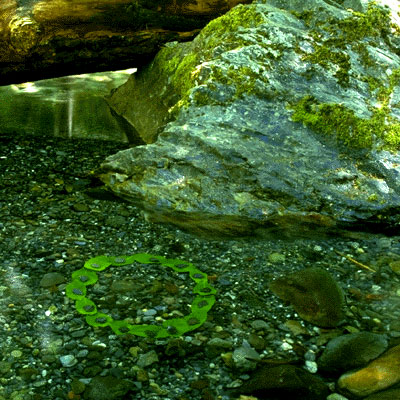
Clear Water Circle.
In
a quiet pool along the east fork of the Eel River a circle was made from
submersed leaves held down by black rocks. Near by, two circular shaped
turtle petroglyphs were found along the river left by an early tribe of
Karuk Indians. When forest cover remains intact, rivers not only run clear
and clean, they also flow throughout the year. When the forest is cleared
rivers turn muddy and swell or shrink. Streams continue to decline in quality
throughout our national forest system. This problem is easily linked to
logging, and especially logging roads. Watershed degradation in the Six
Rivers National Forest has tragically led to the severe decline of anadromous
species of fish native to the region. The pool in this picture, quiet and
clear in the summer when rains are infrequent, probably looks a lot different
in the rainy season when runoff siltation is high. Clear, sparkling, clean
water should be a birthright to all Americans. We can best protect our
watersheds by ending all commercial logging on public lands.
Contact:Northcoast
Environmental Center, 879 9th St., Arcata, CA 95521, nec@igc.apc.org.
